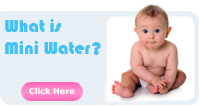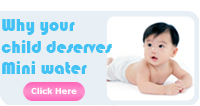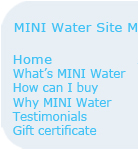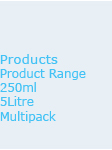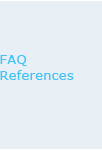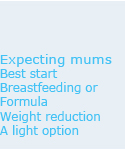Frequently Asked Questions about Mini Water
Click on a question to see the answer.
Do I need to boil MINI WATER before using it?
Boiling?
You do not need to boil MINI Water before use. MINI Water is a natural water that has been packaged via a stringent purification process.
The process goes through a fine filtration of 0.2 micron where the water is “polished” without altering the characteristic of the naturally occurring minerals in the water, followed by ozonation immediately before bottling for the main purpose of disinfecting the bottle and cap in which the water is contained, resulting in a natural water presented in its purest and safest form. There is no artificially added minerals in MINI Water and no chemicals used in the bottling process.
×Is drinking water with added fluoride safe for my child?
Added fluoride?
The pros and cons of fluoridation in drinking water has been a topic well debated by scientists and regulatory bodies for years.
There have been concerns of potential risk of dental fluorosis due to excessive ingestion by infants aged under 12 months. The concern was primarily focused on the reconstitution of infant formula with fluoridated water. The American Dental Association (ADA) recommends that if parents are concerned about the fluoride level intake of their children, that baby formula can be mixed with water that is fluoride free or contains low levels of fluoride (References 1,2,3).
According to the Food Standards Australia & New Zealand (FSANZ), for infants 0 to 6 months of age, based on breast milk feed of 780ml per day, an adequate intake of 0.01 mg per day of fluoride is recommended (Reference 4). Some bottled water has added fluoride up to 0.7 mg per litre. MINI Water contains a low level of naturally occurring fluoride of <0.1 mg per litre.
×
Can you drink enough water to substitute for intake of fluoride supplement?
Fluoride supplement?
Foods Standards Australia & New Zealand (FSANZ) allows up to 1.0 mg of fluoride per litre of bottled water (Referenec 5). WHO’s drinking water guidelines for fluoride is up to 1.5 mg per litre (Reference 6). Adequate daily intake of fluoride depends on age, size and gender. As a practical example, daily intake of 2 mg of fluoride is adequate for a nine to 13-year-old child weighing 88 pounds (40 kg). It is not likely that a child will drink water alone to reach the recommended daily intake of fluoride, no matter the age or size of the child or whether municipal water or bottled water is drunk.
Does MINI Water need to be refrigerated or specially stored?
Special storage?
It is not necessary to refrigerate before or after opening, however, you do need to make sure to replace the cap immediately after each use and keep any unused portion in a cool and clean place of your kitchen, never place it next to washing detergents or food with odour, and never in direct sunlight.
×What is the shelf life for MINI Water?
Shelf life?
The commercial “best before” date is 2 years from the date of manufacture. There is not really a time sensitive shelf life providing the product is properly stored and handled.
×Can I use MINI WATER for mixing baby formula?
Formula mixing?
Yes, when mixing MINI Water with baby formula, it is very important that you remember to pour the MINI Water into a clean bottle first and then add the required amount of formula. If formula enters the bottle of MINI Water, this can cause forming of mould if not handled properly. It is not necessary to refrigerate MINI Water before or after opening, however, it is important to replace the cap immediately after opening and put the unused portion in a cool and clean place in your kitchen or a refrigerator.
×What makes MINI Water special?
Why MINI?
MINI Water is 100% natural spring water freshly extracted from selective springs and contains only a low level of naturally occurring minerals, the water is disinfected by ozonation to be free of bacteria, so no boiling is necessary. MINI Water does not contain any artificially added chemicals. It has a naturally sweet and smooth taste that will please the most discerning palate. It can be mixed directly with baby formula (refer to formula label instructions) or feed to children in place of sweetened or flavoured beverages.
×At what age should I give my child plain water to drink?
When can my child drink MINI?
Food Standards Australia New Zealand (FSANZ) recommends babies consume a diet exclusively of breast milk or formula for the first 4 to 6 months of life. It is not necessary, nor is it recommended, to give your baby plain water before he/she is six months old. When a bottle fed baby starts eating solid food, he/she may be offered a few sips of water between feedings. Breastfed babies usually do not need extra water if they are nursing on demand.
Why do some bottled water have added minerals?
Added minerals?
This is usually carried out in a packaged water which cannot be labelled as “natural water”. In these cases, the water is treated to remove all soluble matter and then minerals such as calcium, magnesium, potassium and sodium are manually added for taste. At the levels of the minerals added, they do not provide any nutritional benefits.
×Is MINI Water sterile?
Sterile water?
Although MINI Water is free of bacteria at the point of manufacture, like any bottled water, it is not considered sterile. Use as directed by physician or by following label directions for use with baby formula.
×If I use municipal water or bottled water with added fluoride, should I still give my child fluoride supplements?
Municipal water and fluoride?
At the allowable levels for added fluoride in drinking water, it should NOT be used as a substitute of fluoride supplement. Consult your physician if using any fluoridated products.
×Is MINI Water “sodium free”? If so, why does your label list "sodium" content?
Sodium free?
Some countries (for example, USA) allow products to be labelled as "sodium free" if the level of sodium is less than 5 milligrams per litre in a serving of approx 250ml (or 8 ounce). The level of sodium in MINI Water falls well below this and can be described as “sodium free”. However, we opt to factually report the content of sodium in MINI Water as being “low in sodium”.
×What is the quality or mineral content of MINI Water?










